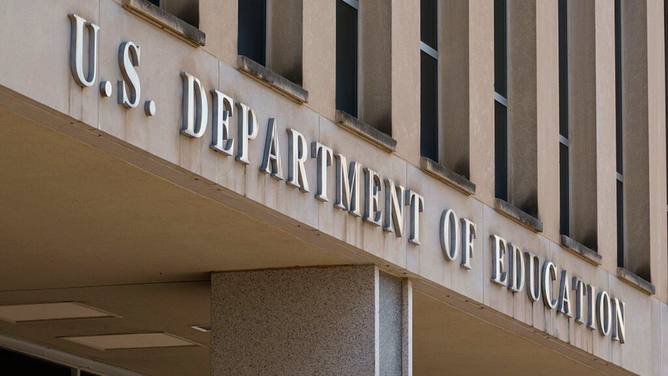Schools That Violate Title IX Could Lose Titles And Trophies — Not Just Funding
Secretary of Education Linda McMahon confirmed the DOE is taking a tougher stance on schools failing to protect girls’ sports and privacy.
The U.S. Department of Education is stepping up its game on Title IX enforcement. And, according to Education Secretary Linda McMahon, schools that violate the federal civil rights law may not just face defunding — but could also be forced to forfeit championships and awards.
During a Title IX Month briefing with female reporters on Wednesday, McMahon confirmed that revoking titles is now "on the table" when it comes to schools that allow males to compete in girls' sports or fail to protect female students' privacy.

Education Secretary Linda McMahon said the department has every intention of pulling funding from states that violate Title IX.
(Getty Images)
Many female athletes are afraid to speak up — worried about backlash, lost scholarships or punishment from their schools. I asked the Secretary if the Department had plans to ensure that athletes who stand up for their rights will be protected from retaliation.
"Sure, that is one of the things you know that we are doing and why we're working also with the [Department of Justice] about that," McMahon said.
"But when you go to these schools, when you start talking to them about the unfairness of it… I would hope that our findings — if we prove that there have been violations — that we would have actions that might even include titles being reversed that have been given to males."
She added, "So those are all the things that I think would help restore the validity, if you will, to what women have been able to achieve."
EXCLUSIVE: After Being Forced To Compete With A Male Athlete, This Minnesota Softball Player Is Fighting Back
McMahon reiterated that the Department is actively investigating Title IX violations across the country, noting that schools in California, Maine, Pennsylvania, Minnesota and Wyoming are already under formal review.
Dept. Of Education Has Multiple Open Investigations Over Title IX Violations
One high-profile case in Minnesota drew national attention earlier this month, when a 17-year-old trans-identifying male pitcher, Marissa Rothenberger, led Champlin Park High School to the girls’ softball Class AAAA state championship. Rothenberger threw 21 innings across three games, giving up just two runs and earning All-Tournament honors.
The Department of Education has now launched formal Title IX investigations into both the Minnesota Department of Education and the Minnesota State High School League for permitting such policies.

(Photo by Kevin Carter/Getty Images)
Similar incidents have sparked controversy in other states as well.
In Washington, another biological male, Veronica Garcia, has won back-to-back state titles in the girls' 400-meter dash, bumping female athletes down the rankings and taking away podium spots and scholarship opportunities.
And in California, AB Hernandez — a 16-year-old male — won two state titles and finished second in a third girls’ track and field event at the California State Championships. That prompted the Department of Education to open a civil rights investigation into the California Interscholastic Federation (CIF).
"It’s unfortunate with Governor [Gavin] Newsom in California," McMahon said. "Because he comes out and says, ‘Hey, there’s no room for boys to compete in girls’ sports.’ And he says that very forcefully — then does nothing about it. He allows it to happen."
RELATED: Donald Trump Sends Warning To Gov. Gavin Newsom Over Males In Women's Sports
The Department has elevated cases in multiple states to the Title IX Special Investigations Team — a joint effort with the DOJ created to fast-track enforcement of federal civil rights law. Currently, some states are trying to get around these laws. For example, Minnesota allows individuals to alter the sex marker on their birth certificate, therefore making it much harder to enforce sex-based categories.
"This is why empowering parents and girls is so important, too," Rachel Oglesby, Chief of Staff for the Department of Education, said. "Because if every single parent actually knows what they're doing and is pissed about it, it's going to be a lot harder for them to find those loopholes because there's way more light on it and more people paying attention."
In other words, federal enforcement of Title IX is back. And this time, schools won’t just risk their budgets, but their banners, too.